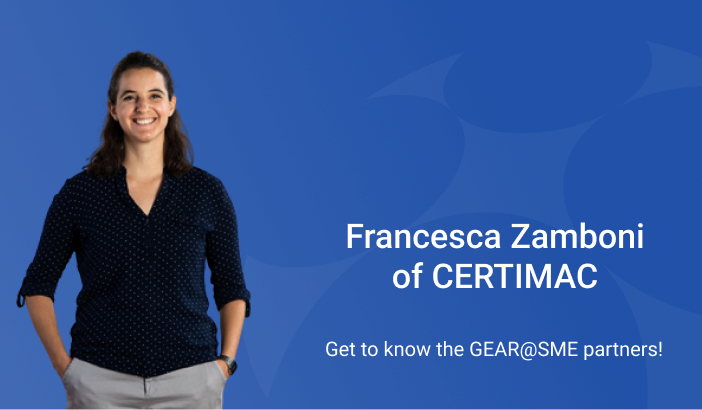
04 Jul Get to know the GEAR@SME partners! Certimac develops the strategic tools
What kind of organisation is Certimac?
Francesca Zamboni: “Certimac is an Italian private research centre and Material&Energy Innovation Laboratory, founded by ENEA and CNR – the two main Italian research bodies. Certimac supports SMEs, big industries and municipalities with solutions and services for energy efficiency, energy management and oriented to RES implementation. Furthermore, it supports material manufacturers, designers, builders, and enterprises to develop and engineer high performance envelopes and innovative materials and components.
Why does Certimac participate at the GEAR@SME project?
“Certimac has strong experience in energy efficiency in the industrial and tertiary sectors. The energy division of Certimac is daily engaged in energy management projects, as well as in the participation in European and regional projects on energy efficiency topics. We are called to a collective and important effort for the energy transition and GEAR@SME’s innovative approach has a strong potential to address the current challenges. This is why Certimac has enthusiastically embraced the project’s vision.”
What are the tasks of Certimac in the GEAR@SME project?
“Certimac is WP4 Leader. The goal of WP4 is related to the development of strategic tools to bridge the gap between demand and supply side of energy efficiency services. Moreover Certimac (with ENEA as Linked Third Party) is responsible for the activities in the Italian Use Case. Supporting the Italian Trusted Partner (Confindustria Emilia) in its daily work with SMEs by offering training, technical advice and useful materials developed within the project are the main tasks of Certimac as UCL.”
How do you like the project so far?
“We believe that the collective approach and the figure of the Trusted Partner as operator of the collective, proposed by the project, can be a strategic lever to foster the increase of energy efficiency within business park companies. In Italy we are taking the first steps towards this new approach, facing some barriers in both companies and stakeholders. The experience and the comparison with other Use Cases will be fundamental to overcome these obstacles.”
What have you already achieved in the project and what are your next tasks?
“We are satisfied with the results achieved so far, but the path is still long and challenging: several (online) training events were carried out targeting companies and Energy Service Providers and a networking event (in presence) was held within the Use Case. We are currently upscaling by conducting online training events for potential trusted partners. We are also planning the National Workshop to be held after the summer.”
What will you take away from the project in the long term?
Gear@SME’s methodology has a strong potential to support a switch and an improvement into approaches oriented to increase the energy efficiency in companies and in particular in SMEs. The collective approach can be applied to heterogeneous contexts and will be the basis for a radical and deep process towards the energy and ecological transition. Moreover, thanks to a partnership with a wide and cross-cutting know-how and background, the exchange of experiences and ideas is proving to be very valuable and useful for daily work with SMEs.”


